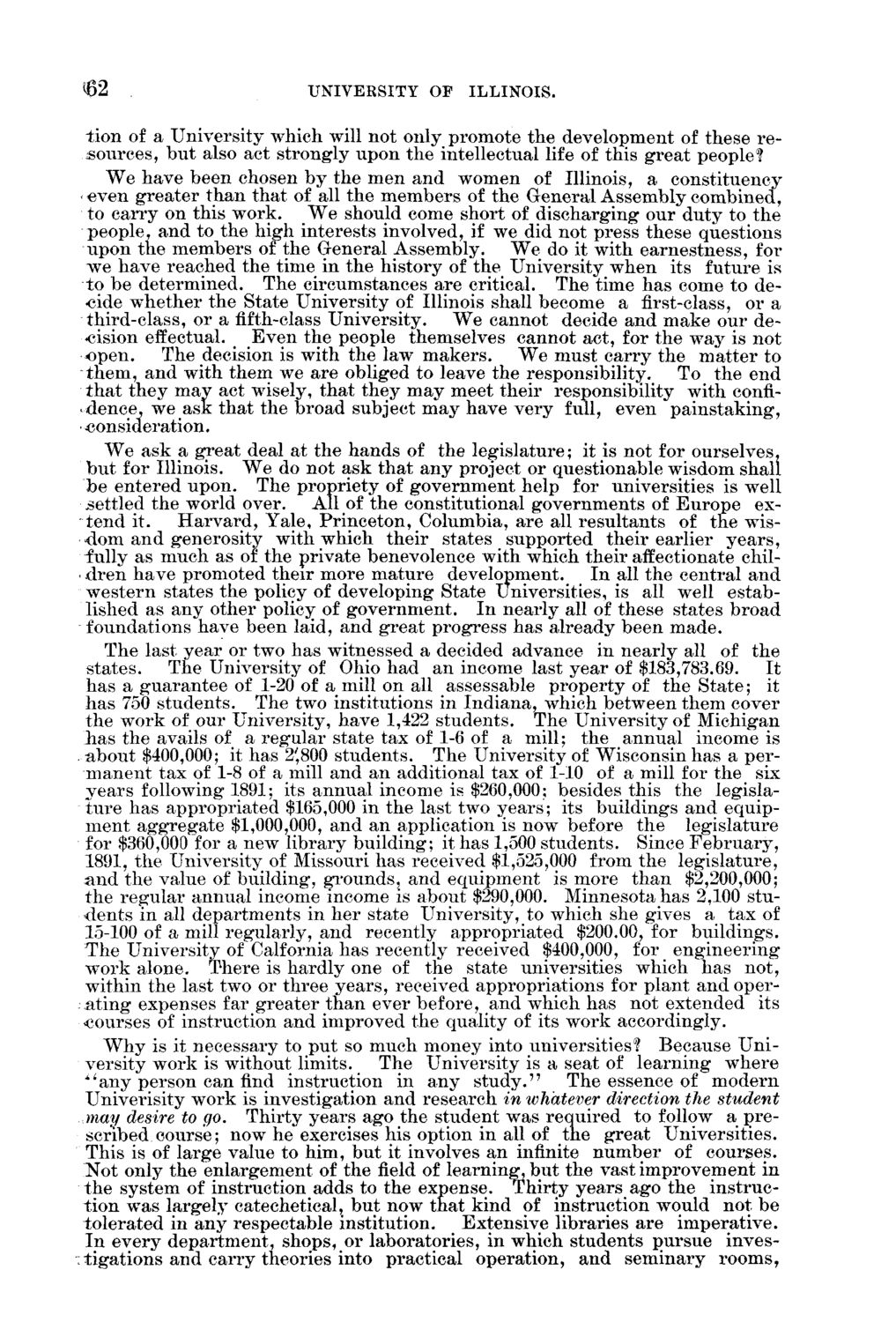| |
| |
Caption: Board of Trustees Minutes - 1896
This is a reduced-resolution page image for fast online browsing.

EXTRACTED TEXT FROM PAGE:
62 UNIVERSITY OF ILLINOIS. lion of a University which will not only promote the development of these resources, but also act strongly upon the intellectual life of this great people? We have been chosen by the men and women of Illinois, a constituency even greater than that of all the members of the General Assembly combined, to carry on this work. We should come short of discharging our duty to the people, and to the high interests involved, if we did not press these questions upon the members of the General Assembly. We do it with earnestness, for we have reached the time in the history of the University when its future is to be determined. The circumstances are critical. The time has come to decide whether the State University of Illinois shall become a first-class, or a third-class, or a fifth-class University. We cannot decide and make our decision effectual. Even the people themselves cannot act, for the way is not open. The decision is with the law makers. We must carry the matter to them, and with them we are obliged to leave the responsibility. To the end that they may act wisely, that they may meet their responsibility with confidence, we ask that the broad subject may have very full, even painstaking, •consideration. We ask a great deal at the hands of the legislature; it is not for ourselves, but for Illinois. We do not ask that any project or questionable wisdom shall be entered upon. The propriety of government help for universities is well settled the world over. All of the constitutional governments of Europe extend it. Harvard, Yale, Princeton, Columbia, are all resultants of the wisdom and generosity with which their states supported their earlier years, fully as much as of the private benevolence with which their affectionate chil• dren have promoted their more mature development. In all the central and western states the policy of developing State Universities, is all well established as any other policy of government. In nearly all of these states broad foundations have been laid, and great progress has already been made. The last year or two has witnessed a decided advance in nearly all of the states. The University of Ohio had an income last year of $183,783.69. It has a guarantee of 1-20 of a mill on all assessable property of the State; it has 750 students. The two institutions in Indiana, which between them cover the work of our University, have 1,422 students. The University of Michigan has the avails of a regular state tax of 1-6 of a mill; the annual income is about $400,000; it has 2^800 students. The University of Wisconsin has a permanent tax of 1-8 of a mill and an additional tax of 1-10 of a mill for the six years following 1891; its annual income is $260,000; besides this the legislature has appropriated $165,000 in the last two years; its buildings and equipment aggregate $1,000,000, and an application is now before the legislature for $360,000 for a new library building; it has 1,500 students. Since February, 1891, the University of Missouri has received $1,525,000 from the legislature, and the value of building, grounds^ and equipment is more than $2,200,000; the regular annual income income is about $290,000. Minnesota has 2,100 students in all departments in her state University, to which she gives a tax of 15-100 of a mill regularly, and recently appropriated $200.00, for buildings. The University of Calfornia has recently received $400,000, for engineering work alone. There is hardly one of the state universities which has not, within the last two or three years, received appropriations for plant and operating expenses far greater than ever before, and which has not extended its courses of instruction and improved the quality of its work accordingly. Why is it necessary to put so much money into universities? Because University work is without limits. The University is a seat of learning where ^any person can find instruction in any study." The essence of modern Univerisity work is investigation and research in whatever direction the student may desire to go. Thirty years ago the student was required to follow a prescribed course; now he exercises his option in all of the great Universities. This is of large value to him, but it involves an infinite number of courses. Not only the enlargement of the field of learning, but the vast improvement in the system of instruction adds to the expense. Thirty years ago the instruction was largely catechetical, but now that kind of instruction would not be tolerated in any respectable institution. Extensive libraries are imperative. In every department, shops, or laboratories, in which students pursue invest i g a t i o n s and carry theories into practical operation, and seminary rooms,
| |